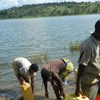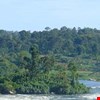
Due to increased agricultural irrigation and large scale dam projects, and inappropriate land and water management practices, the water inflow to the Komadugu Yobe Basin has dramatically been reduced. Action has been taken to establish a legal and policy enabling environment, as well as to increase knowledge among the local communities to establish more sustainable behaviour. The main lesson learnt was that although a multi-stakeholder participatory approach is slow, it helped to mobilise partnership.

With the introduction of IWRM, South Africa has shifted the design and implementation of water management to local institutions. This has created a demand for innovative methods for local stakeholders’ participation. Action was taken to introduce the participatory process Companion Modelling that is based on the use of simulation models and role playing games. Consequently, this case study illustrates new methods and tools that facilitate dialogue and improve decision-making skills of local stakeholders.

Poor domestic and international coordination between South Africa, Swaziland and Mozambique has led to conflicts over the water utilisation of the Komati River basin. Despite these challenges, action has been taken to strengthen the institutional and legislative framework. These actions demonstrate that in the contexts involving transboundary water resources, a strong institutional framework can promote political and economic cooperation between riparian states.

Unclear ownership and no formal mechanism to manage the water source of the Mvutjini earth dam have caused unfavourable conditions for the local community. Action was taken to implement IWRM by the Swaziland Country Water Partnership, aiming to revitalise the dam and set up management rules by involving local stakeholders. This case study illustrates that collaboration and partnership between institutions involved in water resources management is vital for success.
Tanzania is facing increasing pressures on its water resources due to a growing agricultural sector and the effects of climate change. In order to ensure environmental and economic sustainability in the face of water scarcity the local communities of Kiroka village, Morogoro, conceived a project to build capacity for climate adaptation through sustainable land and water management. The participatory approach coupled with capacity building and holistic problem solving that also addresses livelihood issues has proven to be an effective method of implementing an IWRM plan that is sustainable and can be readily subscribed to.

The Great Ruaha River is important in terms of the utilisation of its water for agriculture, meeting the ecological needs, and the generation of hydroelectric power. During the early nineties, a series of zero flows in this previously perennial river alerted the authorities to hydrological and environmental change. A project was initiated to investigate the reasons and possible solutions. This case illustrates the critical role and benefits of long-term, large-scale, interdisciplinary research in approaching complex problems.

Climate change and the increasing number of competing water users have led to the overexploitation of the Pangani river basin resources. Action has been taken to establishing environmental, economic and social implications of different river flow scenarios under expected climatic conditions. This helped to prioritize the allocation of water resources to meet basic human needs and those of ecosystems. The main lesson learnt was that providing a platform for dialogue between key stakeholders and increasing knowledge about the climatic variability and future risk are essential for successful water management solutions.

The Niger River basin is of importance to the region. The Niger Basin Authority was established to foster, promote and co-ordinate studies and programs relating to the Niger River basin. Today the authority is required to promote co-operation among the member countries and to ensure integrated development of its resources. This case illustrates and provides key insights into transboundary river basin management.

Lake Cyohoha and its 508 km2 watershed in the Bugesera region marks the border between Southern Rwanda and Northern Burundi. In the GWP WACDEP climate resilience project, stakeholders analyzed the situation and decided for actions. Drought resistant trees were planted, water points installed and connected to a supply network, fuel saving stoves and biogas was introduced and capacity development events were held.

The Nile region relies heavily on its groundwater, nevertheless, it is often neglected in national water policies. However, efforts were made to integrate groundwater as an aspect of IWRM, predominantly through a proposal of relevant capacity building actions. These were categorised into three groups: groundwater governance, operational management and, analytical tools to support operational management, illustrating that the main focus should still be devoted on the institutional and regulatory frameworks and management instruments.